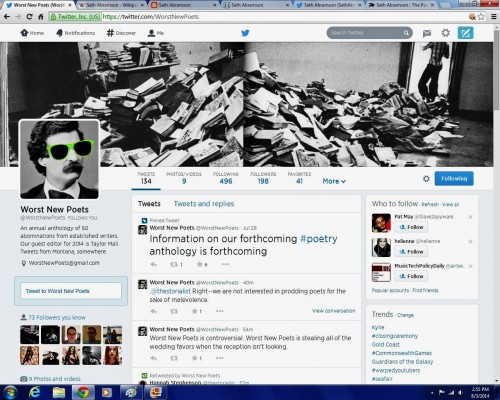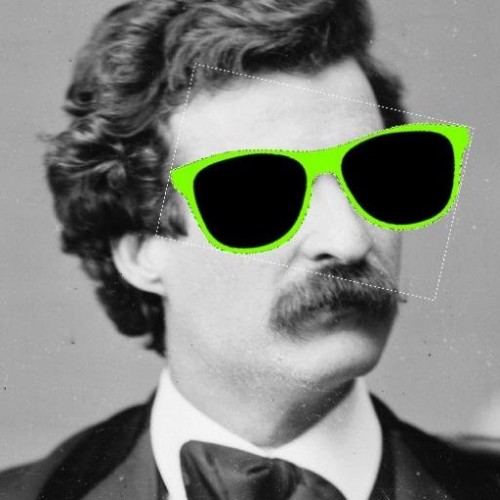Behind the Scenes
Worst New Poets ???????

*******
There’s nothing new about anonymous Twitter accounts taking shots at well-known writers. Some of them are funny. Some of them are mean. Some of them are neither. Some of them are both.
But what’s got my attention about Worst New Poets is that they’re engaging with their Followers (internet heavyweights like Elisa Gabbert and Rebecca Hazelton– but enough celebrity name dropping here) in a generally reasonable and intelligent manner. Plus, of course, how can you not show some interest in someone shoving pies in people’s faces?? (But, I wonder, is this something we need?? … I dunno… And what’s the deal?? … I mean, what’s the deal ?? ..)
So, anyways I reached out to Worst New Poets, they responded promptly and politely, and here, now, is the transcript of a quick little Q & A that we did:
*******
Rauan: Please tell me what Worst New Poets is all about ?? (ie: what is it? why are you doing what you’re doing? what good (if any) do you expect to come of it ??)
Worst New Poets: Worst New Poets was originally a spur-of-the-moment response to the annual release of Best New Poets (whom we admire very much). The impulse to start WNP, however, was not unfounded. These thoughts about the poetry landscape have been gestating in our heads—subconsciously maybe—for quite some time. We thought it was an interesting idea to call out some flaws published by established writers, instead of praising 50 “new” poets that were breaking ground in contemporary poetry. We don’t have a set goal in sight, though we do enjoy the discourse that has been generated in the past week, so we don’t think we’ll stop any time soon.
Like we mentioned during the initial barrage of Twitter attacks (exaggerating), we like the idea of creating discourse within a community that far too often promotes from within. There seems to be a clear consensus among writers that the current literary landscape is extremely incestuous, with writers maybe** getting away with publishing mediocre work behind the strength of their name alone.
**We’re not claiming that every poem that we post or take an excerpt from is “bad.” As pointed out by SEVERAL individuals, “good” and “bad” are both highly subjective terms, and they also suffer behind the anonymous moniker with which we choose to operate.
*******
RK: Do you really plan on publishing (online??) an anthology of 50 “abominations” ??
WNP: We don’t believe we will publish an anthology of 50 “bad” poems. Not only is that maybe impossible (how would we obtain the rights to those poems?), it doesn’t really represent what we’re trying to accomplish. The “anthology” portion of the Twitter bio was more of a joke, a word-for-word replica of the Best New Poets bio.
*******
RK: One of the knocks on you in the twitter world is that you’re anonymous. I believe you responded there that it would be “suicide” to do it under your own name(s). Can you elaborate a bit more on this, what it says about the Poetry Community? And, do you plan on staying anonymous??
WNP: Well it would be suicide, wouldn’t it? WNP is not the end-all, be-all authority on contemporary poetry, nor should it be. Though, when you make claims about the quality of published writing, the first thing people are likely to do is immediately look up WHO is making these claims, and then compare their work in relation to the work being judged. We’re not saying that we’re not proud of our own work—we are, very much so. But that detracts from our goal: to call out a poet or publisher for producing (what we think is) substandard work.
We think we may have glossed over this on Twitter previously, but there are a few simple solutions to not agreeing with what we consider “bad” or “mediocre” poems: unfollow us. Respond to our tweets with a retort. Email us in defense of the poem. Publicly smear our Twitter handle and talk poorly about us at literary parties.
*******
*******
RK: One of the criticisms that I’ve seen on Twitter is that you’re just holding up examples of “bad” poetry by well-known poets (well-known at least in the Indie Poetry Community–Schomburg, Laskey, Limon, Abramson, etc)– ie, you say stuff’s bad but you don’t say why. you don’t offer any real thought or critique. how about, then, taking one of the examples you’ve posted and breaking its “badness” down for us ???
WNP: Well, the short and simple answer to the “no critique” approach that we’ve taken is that Twitter doesn’t allow for much wiggle room. We often find ourselves struggling to fit the quoted poem excerpt with a link (or the name of the poet/journal) in 140 characters. And considering that this was a spontaneous venture, we haven’t yet looked into moving the format to a website platform, though that is an option.
The easiest example we’ve posted of a truly awful poem would be the Taylor Mali piece that was published in the January 2014 issue of Thrush. We don’t feel the need to describe exactly why we dislike this poem, beyond excerpting the last two lines: “Midnight is my only deadline, / the human heart my only beat.” Yuck.
Though we think it’s important to note we appreciate the work that Thrush does in publishing, the editors and contributors alike.
The reason why we tend to poke at “established” writers is because they have more than likely accomplished some very special things, whether that means publishing a (or many) high-quality book(s), attending/graduating from prestigious writing programs, publishing in impressive journals/magazines, etc. And we believe, in the instances we’re pointing out, that they are not working to their full potential, which we think is unfortunate. Also, we think they can probably take a punch from some anonymous Twitter profile. Their careers will not suffer because we took a screenshot of their latest poem in X journal.
*******
RK: Are you Alex Dimitrov ??
WNP: No, but that’s a funny question. We have a Dimitrov poem lined up for sometime next week :)
*******
RK: anything else you’d like to add ??
WNP: Like we mentioned in one of our first tweets, we really like the idea of readers and writers of contemporary poetry sending in links to poems that they think are not terrific. We’ve had a surprising amount of emails since our inception (about a week ago), with links to several different poems/poets, and we’d like very much for that to continue. If anything, the fact that so many people have reached out seems emblematic of the landscape as a whole. If so many people are unsettled/unhappy with the content being published/promoted so often, then why is no one speaking up about it?
Enter: Worst New Poets.
*******
note: you can check out and maybe follow Worst New Poets on Twitter here. and you can email them at WorstNewPoets@gmail.com
Tags: worst new poets


The announced – and welcome – target of this funny, amusingly defensive microblog is “writers maybe getting away with publishing mediocre work behind the strength of their name alone” — in other words, the institutionalization of the circular, merit-distancing criterion of ‘reputation’.
But in the thread, Worst New Poets backpedaled from ridiculing positive name-recognition as a publication criterion by saying they really (at least sometimes) want to expose publishers/venues for having “writers we respect/admire” getting stuff published “that seem[s] to pale in comparison to work written previously by the quoted writer/poet”.
They’re not against the poets they quote! They just want to help them keep writing cool poems.
That’s pretty complicated! and maybe still a bit personal. So what they really really want is: “Discourse. That was & still is our intent.”
But wait! –whatever their targets or intentions, what really really really needs to be remembered is that:
The project is verified!! —because the critique of lazily surfing a wave of previous achievement is being advanced by people who are telling you they’ve already had their criticism…
published.
I’m afraid I’ll need some specifics on what “legitimizes” a poetry review venue.
That’s easy: publication.